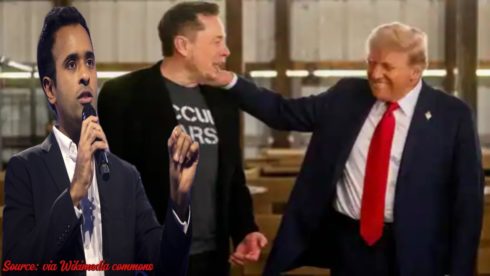President-elect Donald Trump has announced the appointment of business mogul Elon Musk and biotech entrepreneur Vivek Ramaswamy to head a newly established Department of Government Efficiency (DOGE). This department, designed to streamline government functions, is set to be a cornerstone of Donald Trump’s administration, focused on reducing bureaucratic waste, enhancing operational transparency, and utilizing technology to optimize public services.
Donald Trump’s decision underscores his commitment to efficiency and modernization, choosing figures known for their disruptive innovation and relentless pursuit of productivity. With Elon Musk’s vast experience in tech and Ramaswamy’s deep understanding of healthcare and biotechnology, Donald Trump aims to foster a culture of efficiency that could reshape government functions.
Elon Musk and Ramaswamy: A Dynamic Duo for Government Overhaul
Elon Musk, CEO of Tesla and SpaceX, and Vivek Ramaswamy, founder of Roivant Sciences, bring a unique combination of skills and perspectives. Known for tackling ambitious projects, Elon Musk is expected to advocate for technological integration in government, potentially exploring automation and AI in administrative processes. Ramaswamy, with his background in biopharmaceuticals, offers expertise in healthcare reform and data-driven decision-making.
Both appointees share a vision for minimizing inefficiencies in public sectors. Elon Musk’s approach to innovation complements Ramaswamy’s methodical strategies in regulated industries. Together, they are poised to implement high-tech solutions and rigorous accountability measures within the federal government, making the department a focal point for reform.
Goals of the Department of Government Efficiency (DOGE)
The newly formed Department of Government Efficiency (DOGE) is tasked with identifying areas where federal spending can be minimized without compromising service quality. DOGE will target redundant departments, simplify bureaucratic procedures, and promote cost-saving initiatives that make government more responsive and agile.
The department is also expected to reduce the federal footprint by prioritizing digital transformation and fostering cross-departmental collaborations. DOGE will address inefficiencies in areas like procurement, data management, and staffing, setting standards for effective governance. This move aligns with Donald Trump’s agenda to eliminate red tape and deliver better value to taxpayers.
Technology at the Heart of Government Reform
With Musk at the helm, DOGE will likely prioritize the adoption of cutting-edge technologies like artificial intelligence, blockchain, and advanced analytics to streamline operations. These tools have the potential to transform how information is shared, services are delivered, and data is utilized across agencies.
Ramaswamy, on the other hand, brings a particular focus on healthcare innovation, a sector that could benefit significantly from tech-driven efficiencies. By applying modern tools in sectors like public health and environmental management, DOGE aims to make the government faster, more transparent, and more adaptive to evolving needs.
Implications for Federal Workforce and Government Culture
One of DOGE’s main objectives is to cultivate a culture of accountability and performance within government agencies. This shift may challenge traditional norms, as Musk and Ramaswamy push for metrics-based evaluations and outcome-oriented approaches to federal work.
The new direction may require a workforce transition, where employees need to adapt to technology-driven operations. This change, though potentially challenging for long-time government employees, could attract skilled professionals from the private sector who are enthusiastic about innovation in public service.
Reactions from Political Circles and the Public
The appointment of two high-profile figures from the business world has garnered mixed reactions from political circles. Supporters believe Musk and Ramaswamy can inject fresh energy into government, while critics express concern over the privatization of public services. Some worry about the implications of Musk’s corporate-style management in a traditionally bureaucratic environment.
Public sentiment reflects both excitement and skepticism, with many Americans eager to see if DOGE can truly achieve its mission. While the full impact of this decision remains to be seen, it undeniably signals a bold departure from conventional government practices.














